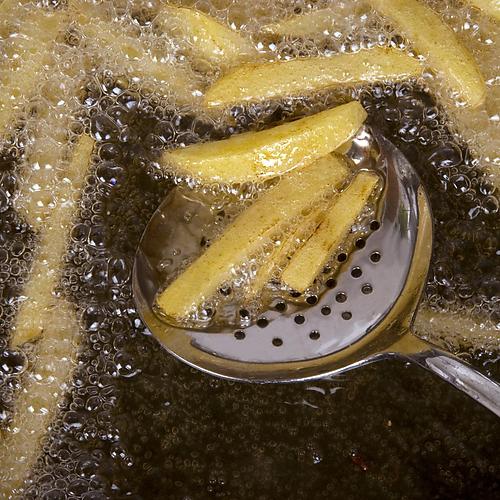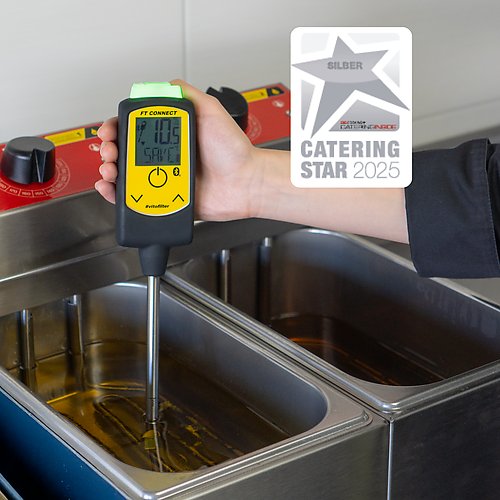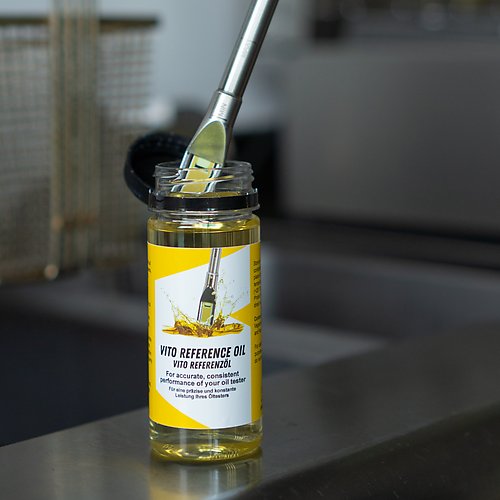While frying is often associated with an unhealthy outcome due to excessive oil absorption, there are some tips to follow to transform this cooking technique into a healthier alternative. In this article, we will explore how to fry in a healthier way, ensuring both flavor and nutrition coexist harmoniously.
Choose the right oil:
The type of oil you use for frying plays a crucial role in the healthiness of your dish. Opt for oils that are lower in saturated fats and high in monounsaturated fats, such as sunflower or canola oil. These oils are rich in healthy components, which can help lower bad cholesterol levels and reduce the risk of heart disease, instead of increasing it.
Maintain the right temperature:
Maintaining the proper frying temperature is essential to ensure that your food cooks evenly and absorbs less oil. Keep the temperature at a maximum of 175°C. When frying in higher temperatures the oil is more likely to form acrylamide. This chemical tends to develop when frying high-carbohydrate foods, like potatoes. Acrylamide is considered harmful for the health. However, frying on a temperature that is too low, can cause the food to suck up a lot of oil and get soggy. By adopting a gentle and cautious frying approach, chefs can safeguard their own well-being and that of their guests, minimizing these risks effectively.
Fry different products in separate fryers:
This point is important to prevent cross-contamination and maintain flavor and quality. It ensures that flavors, allergens, and contaminants from one food item do not transfer to another and preserves the characteristics of each food. Furthermore it allows precise cooking control.
Care for your frying oil:
Cleaning and filtering your frying oil is crucial for maintaining healthy frying practices. Over time, frying oil becomes contaminated with food particles and sediments. These impurities can negatively affect the flavor, quality, and healthiness of your fried foods. Regular filtration the oil helps to remove these contaminants, preserving the oil's optimal quality and reducing the risk of off-flavors and potential health risks. It also extends the lifespan of the oil, saves costs and reduces waste. By keeping your frying oil clean and filtered, you
ensure healthier and more enjoyable fried dishes while promoting safe and sustainable culinary practices.
 Algeria
Algeria  Argentina
Argentina  Australia
Australia  Austria
Austria  Bangladesh
Bangladesh  Belgium
Belgium  Bolivia
Bolivia  Brazil
Brazil  Bulgaria
Bulgaria  Canada
Canada  Chile
Chile  China
China  Colombia
Colombia  Costa Rica
Costa Rica  Croatia
Croatia  Cyprus
Cyprus  Denmark
Denmark  Egypt
Egypt  Estonia
Estonia  Finland
Finland  France
France  Germany
Germany  Great Britain
Great Britain  Greece
Greece  Guatemala
Guatemala  Honduras
Honduras  Hong Kong
Hong Kong  Hungary
Hungary  Iceland
Iceland  India
India  Indonesia
Indonesia  International
International  Ireland
Ireland  Israel
Israel  Italy
Italy  Jamaica
Jamaica  Jordan
Jordan  Kosovo
Kosovo  Kuwait
Kuwait  Latvia
Latvia  Lebanon
Lebanon  Lithuania
Lithuania  Macedonia
Macedonia  Malta
Malta  Mexico
Mexico  Mongolia
Mongolia  Morocco
Morocco  Myanmar
Myanmar  Netherlands
Netherlands  New Zealand
New Zealand  Norway
Norway  Oman
Oman  Pakistan
Pakistan  Panama
Panama  Peru
Peru  Philippines
Philippines  Poland
Poland  Portugal
Portugal  Romania
Romania  Russian Federation
Russian Federation  Saudi Arabia
Saudi Arabia  Senegal
Senegal  Singapore
Singapore  Slovakia
Slovakia  Slovenia
Slovenia  South Africa
South Africa  Spain
Spain  Sweden
Sweden  Switzerland
Switzerland  Syria
Syria  Taiwan
Taiwan  Thailand
Thailand  Turkey
Turkey  United Arab Emirates
United Arab Emirates  United States
United States 



